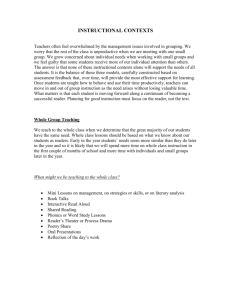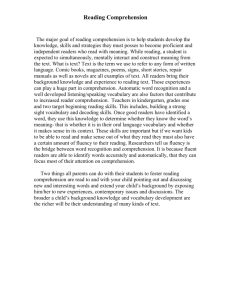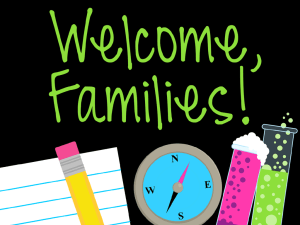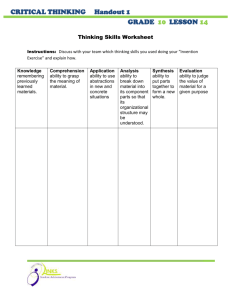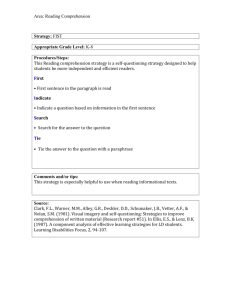dictionary comprehension
advertisement
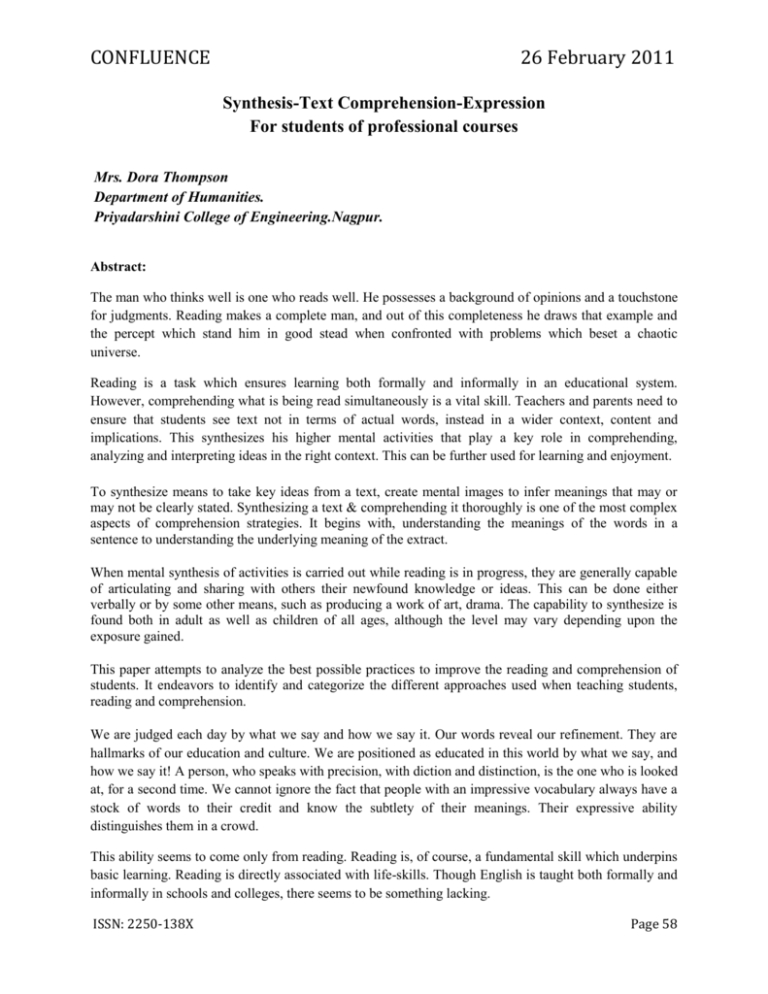
CONFLUENCE 26 February 2011 Synthesis-Text Comprehension-Expression For students of professional courses Mrs. Dora Thompson Department of Humanities. Priyadarshini College of Engineering.Nagpur. Abstract: The man who thinks well is one who reads well. He possesses a background of opinions and a touchstone for judgments. Reading makes a complete man, and out of this completeness he draws that example and the percept which stand him in good stead when confronted with problems which beset a chaotic universe. Reading is a task which ensures learning both formally and informally in an educational system. However, comprehending what is being read simultaneously is a vital skill. Teachers and parents need to ensure that students see text not in terms of actual words, instead in a wider context, content and implications. This synthesizes his higher mental activities that play a key role in comprehending, analyzing and interpreting ideas in the right context. This can be further used for learning and enjoyment. To synthesize means to take key ideas from a text, create mental images to infer meanings that may or may not be clearly stated. Synthesizing a text & comprehending it thoroughly is one of the most complex aspects of comprehension strategies. It begins with, understanding the meanings of the words in a sentence to understanding the underlying meaning of the extract. When mental synthesis of activities is carried out while reading is in progress, they are generally capable of articulating and sharing with others their newfound knowledge or ideas. This can be done either verbally or by some other means, such as producing a work of art, drama. The capability to synthesize is found both in adult as well as children of all ages, although the level may vary depending upon the exposure gained. This paper attempts to analyze the best possible practices to improve the reading and comprehension of students. It endeavors to identify and categorize the different approaches used when teaching students, reading and comprehension. We are judged each day by what we say and how we say it. Our words reveal our refinement. They are hallmarks of our education and culture. We are positioned as educated in this world by what we say, and how we say it! A person, who speaks with precision, with diction and distinction, is the one who is looked at, for a second time. We cannot ignore the fact that people with an impressive vocabulary always have a stock of words to their credit and know the subtlety of their meanings. Their expressive ability distinguishes them in a crowd. This ability seems to come only from reading. Reading is, of course, a fundamental skill which underpins basic learning. Reading is directly associated with life-skills. Though English is taught both formally and informally in schools and colleges, there seems to be something lacking. ISSN: 2250-138X Page 58 CONFLUENCE 26 February 2011 My concern here is to deal well with the role of English for Specific Purposes (ESP) professionals in engineering colleges. It not only imparts linguistic skills to students but also soft skills. As the range of employment for engineers and technologists expand in the twenty-first century, there is a need to teach multiple skills to them. At the same time, they are required to communicate effectively in different situations. They need to think creatively and critically, demonstrate good interpersonal and team skills and also need to possess a set of soft skills demanded by recruiters. Unfortunately the most commonly missing of all the skills is the ability to converse freely in English. This stems from the fact that there is a basic inability to comprehend language. This springs from the harsh reality that there is virtually no reading taking place. The question whether the Engineering English course addresses the needs of students and expectations of recruiters, needs serious consideration. The fact that today’s youngsters at large are not able to comprehend the written word and converse fluently, can definitely be attributed to the fact that they just do not read. Today’s Engineers specially, in the context of the complexities of the field, must be able to comprehend ideas, follow arguments, and detect implications, suppositions and inferences! They may know most of the words in the text already, but they need to also determine the meaning of many familiar words used in a different context. This is apart from the unfamiliar words used. I still remember the occasion when an 8th semester student of B.E-Electrical met me, recalling the pains I had taken in guiding him. He then began recounting his campus recruitment interview with some of the big-wigs of Industry. I realized that he had hardly spoken for two minutes and he had used so many: 'you was', 'he don't', 'I am agree', 'they didn't told' ....etc. He was extremely well dressed in spotless linen, polished shoes and styled hair. And of course! He did not forget to smile generously at every girl passing by. But he was hardly aware of the unease he caused to me. He made me feel that it was his birthright to speak English, quite the way he wanted to. I felt he had the confidence of Dale Carnegie in public speaking. Alas! All my efforts seemed to have been in vain!! Who knows? It is said that language is alive. Maybe some day I could learn to speak like him? Factors Influencing Comprehension and Synthesis. 1. Deficit Reading As mentioned earlier, many students have a poor command over English because they find reading, a boring and cumbersome exercise. I am always taken aback when I hear people say that they hate to read. They may not realize that they are destroying their chances of being economically successful. A successful reader is an efficient and productive personality. There are people who have never got the exposure to reading but when they begin reading with a new-found interest, they understand words which later transform into thoughts and ideas. You can become an active, effective reader when you have control over its complete comprehension. Although, reading means different things to different people and skills vary with every individual, reading is a skill that can be improved. Students from various backgrounds are in reading courses for a variety of reasons. Weaknesses in vocabulary, comprehension, speed, or a combination of all three may be the result of ineffective reading habits. ISSN: 2250-138X Page 59 CONFLUENCE 26 February 2011 Developing Interest in Reading First and foremost, enhancing students' reading is one of the major concerns in the field of teaching. There are different strategies that teachers can follow in order to support and encourage students to read properly as well as to develop their critical thinking. To achieve this, students can be put into studygroups of two. When a student is part of a study group meant for reading, they help each other to think through and analyze the meaning of a text or a concept. One is allowed to explain to the other his or her perspective. Teaching another student develops the ability to analyze one’s rate of comprehension. During the students’ "teaching" sessions, the study partners can help by asking questions. This can be arranged in a group discussion. Trying to answer questions raised by others further helps the student to deepen his or her interest in reading leading to the comprehension of material. Study-buddies can try and think of an example that might illustrate the concept or concepts. Once the students are satisfied with the comprehension, they should write a paraphrase of the concepts which should be much easier. Then a summary can be composed which can simply be a list. In summarizing, good readers can extract from the writing what is important for the particular task they are employed in. And they can do it quickly! Summarizing and paraphrasing will test the synthesizing ability of the person. This is a method for consciously developing reading habits. It is a plan for getting the most out of reading. It allows you to have an idea of what to expect from the text. Most importantly, it gives you techniques to use when you are experiencing difficulties. Secondly, it is important to find out the level of students’ reading comprehension in their native language. The basic skills and degree of understanding in any language is the same. Those who have a basic tendency to read in their vernaculars can be persuaded to begin reading in English. Identifying those having an affinity for reading skills and motivating them to read in English could well be worked out. Loud Reading is an excellent method of improving pronunciation. It also helps in setting English Language firmly on your tongue with all its intricacies. Loud reading helps to articulate the jaw muscles well so that the strains and stresses of English Language settle well. If one can read very loudly daily, the coarseness of mother tongue influence goes away. This also helps in fine tuning our accent. Introducing and teaching comprehension strategies by reading aloud to our students and discussing making connections, visualizing, questioning, determining importance and inferring, eventually helps in synthesizing the text. 2. Dearth of Vocabulary There has always been a strong correlation between voracious reading and intellectual disposition of a person. In other words, students who have a large vocabulary are usually good readers. This is not very surprising, since the best way to acquire a large reserve of vocabulary is to read extensively, and if you read extensively you are likely to be or become a good reader! So it goes without saying if a child has to be successful at school he should be encouraged to read. Reading non-fiction in English is probably the most important, but English fiction and any reading in the mother tongue - if done extensively - will help your child develop the reading competence that is essential for academic achievement. Educational researchers have found that there is a sturdy correlation between reading and intellectual ISSN: 2250-138X Page 60 CONFLUENCE 26 February 2011 success. In other words, a student who is a good reader is more likely to do well in school and pass exams than a student who is a weak reader. Refining your vocabulary The key objective to reading fluency is the spiraling of vocabulary through the use of word play, puzzles, word-chain etc. Buildup of vocabulary remains an undisputed component in the mastery of reading. In particular, students with reading difficulties need to see the high frequency words in context if they are to better comprehend how written language works. It is fairly common in English medium schools, to find students speaking in vernacular languages and teachers passing by turning a deaf ear to them. I remember the sweet and painful punishments meted out by my teachers if we conversed in any language other than English in school. The reminiscences of the past are still active and alive today. Today, even the Chinese have appreciated the fact that, if they want to be truly International they cannot escape the clutches of English, and are actively promoting English education in their schools. The groundwork should have begun at the tender age of 11 and 12. Today they carry mobile phones to school, using all types of shortcuts in their SMS’s. Still worse is the depletion of vocabulary from the ever increasing number of chat windows opened on the Facebook and Orkut. An example:Student A: hwz lyf? Student B: gud Student A: cn I cum 2 ur plc 2dy Student B: nopes, moms t hm. Student A: o.i.c Student B: Lts c 2mro Student A: wen don gos 2 ofz Student B: b r b Student A: k Student B: yup, tl me Student A: wil go fr a movi...2moro Student A: gr8..wat n idea sarji. If students use such alien language at the school level what can we expect from them at graduate level? Parents and Teachers feel archaic before the alarming brains of the children today. Most of the sms abbreviations above may not be the language that the elite group understands. ISSN: 2250-138X Page 61 CONFLUENCE 26 February 2011 Moreover reading has become an old-fashioned reality and pain to these young ones. There are so many sources of entertainment, sending at least as many as 500-600 messages per day, hang outs and night outs, internet surfing, Face book chatting are all placed first in the priority list. Reading does not fall in this category of 'to-do-list'. Eventually when they are left with no choice as college students and have to read their text books by force, they experience the burden of a lifetime weighing on them. This is where they fail to comprehend what they read. Today's school children - could be tomorrow's Engineering students and today's Engineering students -could be tomorrow's CEOs. I would like to throw some light upon the root causes of this infectious disease of not knowing Language. I recall one of the letters of application submitted by a 1st year Engineering student.“Myself, Mr.Sudhanshu Mehta, most humbly beg to fractured my legs.....so leave me for two days”. It is not an astonishing element but the status of affairs definitely seems to be pathetic and seem to wither away from the realms of our regime. Here it is not about the stock of vocabulary that matters but the sheer negligence of the basic requisites of constructing a simple sentence. We cannot expect Synthesis to take place in this scenario, leave alone understanding. To fully or partially understand a text one must have basic understanding of the vocabulary. Finding synonyms using a dictionary is a strategy that can help a student understand the text better; so for someone used to that practice, it can be used to bridge the gap to better understanding followed by expression. A fun game which has triple learning effect on the learner is ‘vocabulary net work’. Just one word is given to the class to form a chain of words till it makes sense. The rule is that every sentence should have one adjective or else it cannot be called complete. For e.g.: If the word given is ‘college’, it can be continued as, college-gathering- enjoy- success-partycompetition-few-many-ragging- dangerous-fatal-accidents-driving-recklessly-traffic signals.......and so on. After writing these words on the board the students are allowed to put ideas together as they like and frame sentences. Synthesizing your text According to Webster's Dictionary, comprehension is "the capacity for understanding fully; the act or action of grasping with the intellect." Webster also tells us that reading is "to receive or take in the sense of (as letters or symbols) by scanning; to understand the meaning of written or printed matter; to learn from what one has seen or found in writing or printing. Comprehension = understanding! There are many reasons why people read. Sometimes you read a text to study some material, sometimes you read for pure pleasure, and sometimes you read to follow a set of rules. As a student, much of the reading done is to learn assigned material. You get information from everything you read; on the contrary we do not read everything for the same reason or in the same way or at the same rate. Each purpose or reason for reading requires a different approach. Things that influence how fast and how well you read are the text and the reader. ISSN: 2250-138X Page 62 CONFLUENCE 26 February 2011 “Thinking aloud" or trying to explain what you've read to someone else increases your ability to effectively communicate and further what you've learned from your reading. When you comprehend what you read it is like taking a trip around the world, a trip that takes you outside the bounds of your existence. Reading is your ticket to whatever you choose to do and become. Reading is your future as well as your past. Though Reading comprehension is a factor of several things, one of the more frequently overlooked aspects is, understanding what we read and the ability to express it fearlessly. We take on a reading assignment in order to learn more, but we forget to ask questions about the information, pull in material that we already know on the topic, or consider alternatives to the author's perspective. However, if we take the time to do these things, our comprehension of the material will dramatically increase because we will have considered the points from an informed perspective by trying to synthesize it. Changing the habit of reading to include these techniques will require some practice, but mindless reading of material for study is not creating effective learning, so we must begin to read differently if we want different results. Synthesis is the ultimate goal of reading. True comprehension may not be testable through standardized means; however, proficient readers regularly employ a variety of comprehension strategies to varying degrees, some of which may be observable. When they truly understand, readers come up with something new that they can then make use of or communicate to others. ISSN: 2250-138X Page 63

